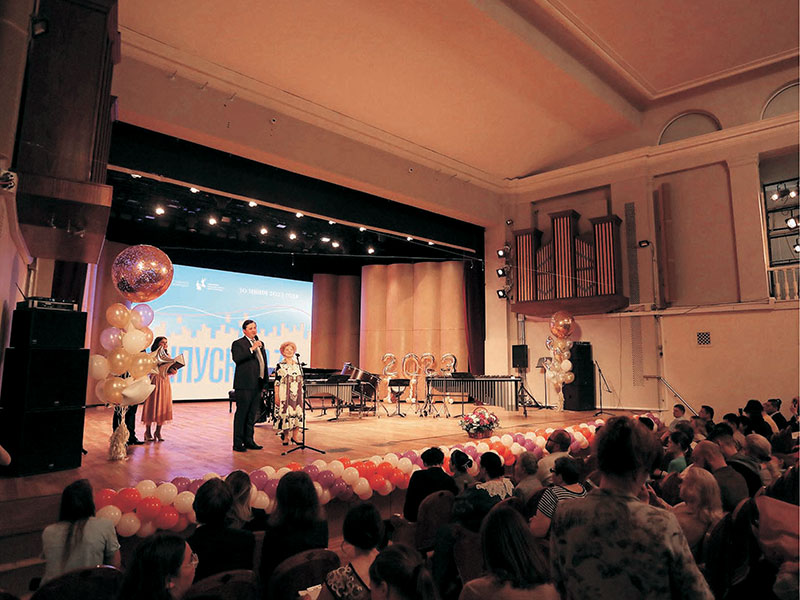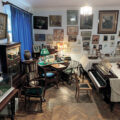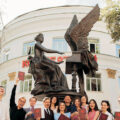- Музей-квартира Е .Ф .Гнесиной / Gnesina’s Museum-Apartment
The Gnesin Russian Academy of Music is a legendary place. Its graduates play to full rooms all over the world and consistently emphasize that they owe their careers to the academy and the principles introduced into education by Elena Gnesina, her brother and four sisters, who opened a private music school in Moscow 129 years ago.
Music history
The Gnesin Music School welcomed its first students on February 15, 1895.
Just like other private schools, quite a lot of which were opening in Moscow at that time, the Gnesin School was founded by the graduates of the Moscow Conservatory. Sisters Evgenia and Elena Gnesin based their school’s program on the properly structured educational process rather than their students’ innate talents.
The school’s popularity and authority grew rapidly. The five Gnesin sisters, who devoted their entire lives to music education, lived in the same house where the school was located. The friendly family-like atmosphere of the school attracted both students and teachers. Already in the pre-revolutionary period, the Gnesin School earned an excellent reputation and was recognized for a number of important pedagogical initiatives, the most striking of which was the establishment of the first school choir in Moscow.
Elena Gnesina’s unyielding will and inexhaustible energy helped to not only protect the school against the whirlwinds of history but also expand it significantly. In 1919, the school was turned into a state-run institution, and in 1920, it was divided into a children’s school and a college under the same management. In 1923, Mikhail Gnesin, a student of composer Nikolay Rimsky-Korsakov, established a department of composition and music theory. The growing number and level of students soon turned the Gnesin College into one of the best secondary education institutions training conservatory musicians. This led to the decision to create a new higher music education institution, and in 1944, the government adopted a resolution to establish the Gnesin State Music and Pedagogical Institute. In 1946, a ten-year music school was opened at the institute. Thus, a complex of four educational institutions was formed that included an institute, college, special school, and a children’s school. Distance learning and evening courses were developed along with numerous textbooks, teaching aids, and new technical learning tools.
In the 1940s, new faculties of choir and conducting and folk instruments were added to the already existing piano, orchestra, vocal, and music history, theory and composition faculties. The process of introducing new faculties and departments has especially intensified in the new century, with new additions including the faculties of music production and folk music performance and the departments of symphony music/opera conducting, Russian folk instruments, music pedagogy, and applied music studies.
From the very beginning, the Gnesin Institute has been actively sharing its experience with numerous Russian educational institutions, supervising the work of several music schools, holding various seminars and advanced training courses. By the 1990s, it became the largest music and educational center in Russia and, quite deservedly, was converted into the Gnesin Russian Academy of Music, becoming the only Russian music education institution to be accredited with this status.
Where music lives
The old house where the Gnesin sisters raised future music stars was demolished during the construction of Novy Arbat Street. In 1937, the construction of a new large building for the Gnesin music conglomerate began on Povarskaya Street. Interrupted by the war, it was resumed in late 1943. The building was mostly finished in September 1946, becoming the first building constructed in the center of Moscow specifically for a university. Later, two Gnesin schools moved to their own premises, and in 1974, a new college building was constructed nearby. In 1989, classrooms and a chamber hall were opened in the neighboring Shuvalova House, a restored 19th-century architectural monument.
All stars
Elena Gnesina remained head of the institute until the end of her life. Being herself the embodiment of the great musical traditions, she managed to bring together several generations of musicians. Her assistant in construction management and development of new educational formats was her student Yuri Muromtsev, conductor and professor at the opera training department. In 1953, he replaced Elena Gnesina as the head of the institute. Later, the academy was headed by the famous choirmaster, People’s Artist of the USSR, Professor Vladimir Minin. The institute’s activities were significantly expanded and new faculties were opened under the leadership of Professor Sergey Kolobkov. In 1981¬–1984, the academy was headed by the violinist, member the Borodin Quartet, laureate of the State Prize of the RSFSR, Professor Yaroslav Alexandrov, and in 2000–2008, the head was the pianist, Honored Artist of the Russian Federation, Professor Mikhail Sayamov. In 2008, he was succeeded by Galina Mayarovskaya, Honored Artist of the Russian Federation, Professor, Candidate of Pedagogical Sciences. Since 2019, the academy is headed by Professor Alexander Ryzhinsky, Doctor of Arts, laureate of the Russian Government Award.
Numerous outstanding musicians have worked at the Gnesin Academy over the years: pianists Lev Oborin, Yakov Flier, Maria Yudina; violinists Vladimir Spivakov, Mikhail Fichtenholz, Abram Yamplosky, Yuri Yankelevich; cellists Valentin Berlinsky, Alexander Vlasov; violist Vadim Borisovsky; singers Nina Verbova, Zara Dolukhanova, Panteleimon Nortsov, Mark Reizen; conductors Kemal Abdullaev, Semyon Sakharov, Nikolay Sergeev, Sergey Skripka, Sergey Trubachev; composers Aram Khachaturian, Boris Tchaikovsky, Alexander Chugaev, Vissarion Shebalin; pop performers Gelena Velikanova, Joseph Kobzon, Lev Leschenko.
A note of the future
The Gnesin Academy quickly became a launching pad for ensembles of young musicians making their first steps towards fame. In the late 1940s, the Academic Students’ Choir was formed at the choir and conducting faculty, and the Symphony Orchestra and the Orchestra of Russian Folk Instruments were created. In the 1950s, the Bayan and Accordion Orchestra (now called “Ad Libitum”) and the Chamber Orchestra were established. The famous Moscow State Academic Chamber Choir headed by Vladimir Minin and the Dmitry Pokrovsky Ensemble originate from the Gnesin Institute students’ initiatives.
Today, the academy is the base for the Speranksy Opera Theater Studio and numerous folk and jazz ensembles, including the Academic Band Jazz Orchestra. Almost all of them perform at various concert venues in Moscow and other cities and travel abroad.

This year, Galina Mayarovskaya, Head of the Department of Musical Art and Contemporary Performance (UNESCO Chair) and President of the Gnesin Russian Academy of Music, celebrates her 80th birthday. From 2008 to 2019, Mayarovskaya served as head of the Gnesin Russian Academy of Music. Under her leadership, new departments were opened, international cooperation and cultural exchange expanded, and large-scale events for Russian and foreign students were held at the academy.
Galina Mayarovskaya graduated from the Azerbaijan State Conservatory as an academic choir conductor. In 1972, she was appointed deputy head of the music school in the town of Elektrostal. In 1984, she was invited to the department of science and education of the Ministry of Culture where she worked for 25 years, starting as inspector and eventually becoming deputy head of the Department of Cultural Heritage, Science, and Education. In 2008, Mayarovskaya was elected head of the Gnesin Russian Academy of Music. In 2014, she opened the UNESCO Department of Musical Art and Contemporary Performance. She is co-chairwoman of the Educational and Methodological Association for Music Education, member of the European Association of Conservatories, member of the Executive Board of the International Music Council, president of the Association of Music Education Institutions of Russia, member of the Board of the Ministry of Culture of the Russian Federation, member of the Commission of the Russian Federation for UNESCO, Honored Artist of Russia, laureate of the Russian Government Award, and holder of the Order of Friendship.
Tatiana Borisova
Photos provided by the Elena Gnesina’s Memorial Museum-Apartment



